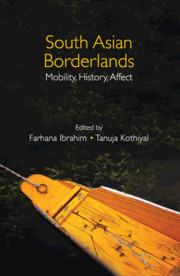Book contents
- Frontmatter
- Contents
- List of Figures and Tables
- Acknowledgements
- Introduction
- 1 Paradise at the Frontier: Kashmir as a Political Terrain and Literary Landscape in the Mughal Empire
- 2 Borders in the Age of Empire and Nation-States: The Honeycomb of Borderlands: Kumaun, Western Tibet and Far Western Nepal
- 3 Borders, Difference, Recognition: On the Cause(s) of Gorkhaland
- 4 Embattled Frontiers and Emerging Spaces: Transformation of the Tawang Border
- 5 Relative Intimacies: Belonging and Difference in Transnational Families across the Bengal Borderland
- 6 Reading Parijat in Nepal: The Poetics of Radical Feminism Negotiating Self and Nation
- 7 Commodity Journeys and Market Circuits: Making Borders ‘Natural’ in Colonial Western Himalayas
- 8 Frontiers, State and Banditry in the Thar Desert in the Nineteenth Century
- 9 Bureaucracy and Border Control: Ethnographic Perspectives on Crime, Police Reform and ‘National Security’ in Kutch, 1948–52
- 10 Frontier as Resource: Law, Crime and Sovereignty on the Margins of Empire
- About the Contributors
- Index
Introduction
Published online by Cambridge University Press: 17 September 2021
- Frontmatter
- Contents
- List of Figures and Tables
- Acknowledgements
- Introduction
- 1 Paradise at the Frontier: Kashmir as a Political Terrain and Literary Landscape in the Mughal Empire
- 2 Borders in the Age of Empire and Nation-States: The Honeycomb of Borderlands: Kumaun, Western Tibet and Far Western Nepal
- 3 Borders, Difference, Recognition: On the Cause(s) of Gorkhaland
- 4 Embattled Frontiers and Emerging Spaces: Transformation of the Tawang Border
- 5 Relative Intimacies: Belonging and Difference in Transnational Families across the Bengal Borderland
- 6 Reading Parijat in Nepal: The Poetics of Radical Feminism Negotiating Self and Nation
- 7 Commodity Journeys and Market Circuits: Making Borders ‘Natural’ in Colonial Western Himalayas
- 8 Frontiers, State and Banditry in the Thar Desert in the Nineteenth Century
- 9 Bureaucracy and Border Control: Ethnographic Perspectives on Crime, Police Reform and ‘National Security’ in Kutch, 1948–52
- 10 Frontier as Resource: Law, Crime and Sovereignty on the Margins of Empire
- About the Contributors
- Index
Summary
Borders and borderlands have perhaps never been as prominently in the public consciousness as they are in the contemporary moment. This is equally true of academic, governance and policy discourse. Globally, refugees are pushing across state borders seeking homes away from sites of conflict, religious persecution, genocide and medical or climate disasters. In response, states are tightening controls over their borders, enforcing stricter surveillance and monitoring of visa regimes for incoming migrants, even as they seek to enforce exclusionary regulatory mechanisms over their own citizens as they determine who can stay and who must leave, amending criteria for citizenship and belonging. Migration across state borders is matched by internal mobility within state boundaries as people move constantly in search of jobs, education and marriage. In crossing borders, whatever their scale, migrants create new borderlands in the process. Through resettlement, they once again become enmeshed in borders of other kinds, as fear, rumour or suspicion serve to configure their relationship with their new neighbours. Within India, the casting of the Muslim citizen as the ‘outsider’ or the ‘internal enemy’ is spatially instantiated with areas within cities being referred to as ‘mini-Pakistans’ (Ghassem-Fachandi 2012: 231) and temporally manifested through a citizenship regime that ‘oscillates ambivalently between encompassment and closure’ (Roy 2010: 7). The passage of the Citizenship Amendment Act (CAA) in late 2019 marks the latest in a series of legislations on India's ‘citizenship regime’ (Jayal 2013). This is the third amendment to the Citizenship Act, with earlier changes incorporated in 1986 and 2003, each of which was formulated as a response to the crisis of potential Muslim migration into India. By legalising the status of non- Muslim illegal migrants (who qualify to be settled as ‘refugees’) from Afghanistan, Bangladesh and Pakistan (in effect all the ‘Muslim-dominated’ states in its neighbourhood), the 2019 Act renders Indian citizenship as an attribute that is increasingly being seen as exclusive of Islam. Similarly placed Muslim migrants are deemed ‘infiltrators’ by the Act. The passage of this Act created a nationwide emergency of sorts, with massive popular protests driven especially by students, women and young people who poured out onto the streets protesting what they felt was an exclusionary and anti-constitutional move.
- Type
- Chapter
- Information
- South Asian BorderlandsMobility, History, Affect, pp. 1 - 20Publisher: Cambridge University PressPrint publication year: 2021



